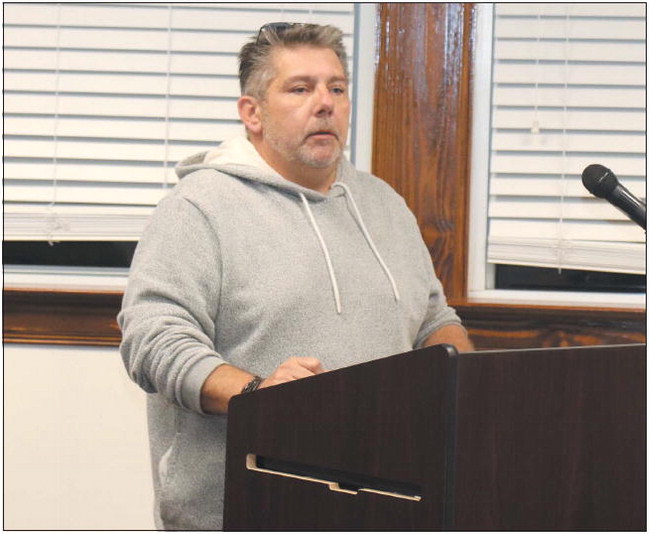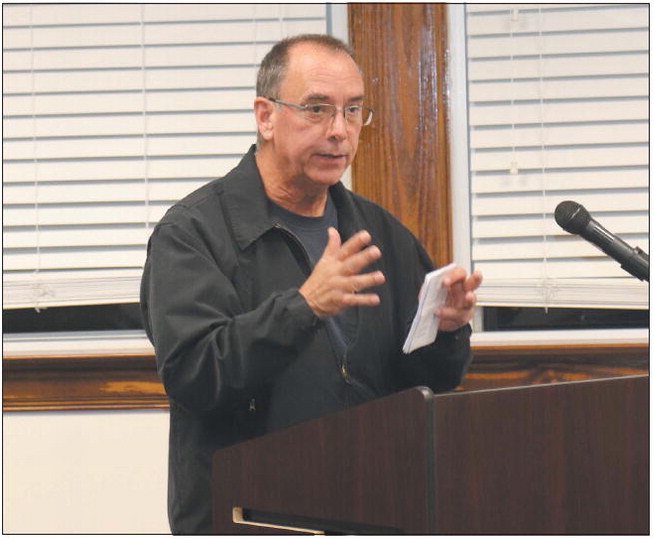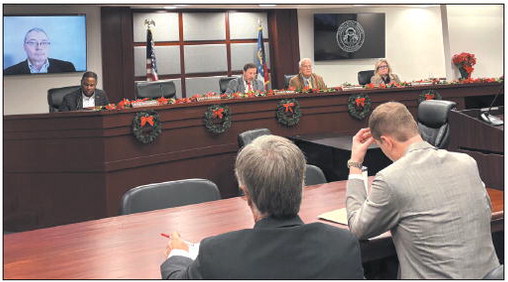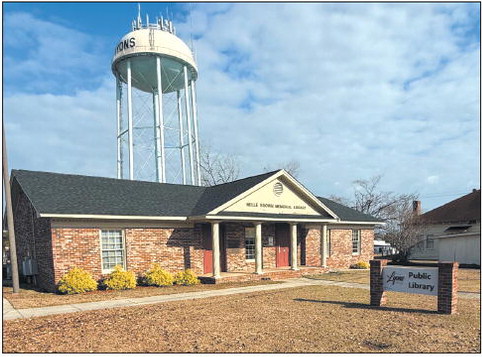continued from page April 18, ….


continued from page
April 18, 2024, which created three major components regarding property taxes: a statewide floating homestead exemption, a new local option sales tax, and property tax procedural changes.
Though this bill was signed into law in April, it was contingent on the passage of an amendment to the State Constitution, which was voted on during the November 5 General Election. This amendment stated that the statewide floating homestead exemption would be created, but that local governments – city, county, and board of education – had the ability to opt out of the legislation if they felt the need. Some examples of reasons to opt out which were provided by the Association of Georgia County Commissioners included the existence of a local floating homestead exemption and complications that could arise because of the differences in what makes up the county’s property digest, as the exemption draws county funding from commercial and non-homestead properties. This amendment was passed in the state, as 62.92% of voters agreed to allow the governments to opt out of the law. In Montgomery County, voters followed this approval, as 62.52% of voters authorized the ability for governments to decide whether or not to join the exemption.
The Montgomery County Board of Education discussed the legislation during their meeting last month, where Board Attorney Daniel O’Connor explained that the homestead exemption capped the increase in taxes at the prior year’s inflation rate – a process which he felt could be both beneficial and detrimental to communities throughout the state.“ That’s great if you’re a homeowner that stays in your home a long time, and it probably works well in some urban districts and districts where there’s lots of industry and commercial properties that you can collect taxes from. But it’s something to consider when you’re in Montgomery County, where most of the properties are homeowners,” he explained. “If there is a big exemption – we know the cost of things is not going to go down – there could be harm if we’re locked into this.”
The Board agreed to host the needed public hearings to exempt themselves from the exemption but stated that this decision to hear concerns from the public did not mean that they had already decided on opting out. “This does not mean that we have voted to opt out of the exemption – just that we agree to let the public share their thoughts on it,” Board Member John O’Conner clarified. The district issued a statement that the decision behind their announced intent to opt out is “a concern to maintain local control to ensure sufficient funding to meet the educational needs of the community’s children in the future.”
To begin each hearing, Montgomery County Schools Superintendent Ronda Hightower gave the attendees a presentation on why the school would be considering the exemption, as well as the school’s values and priorities in making their decision.
“One of the things that I believe in strongly is that none of us are as smart as all of us.It takes all of us and our different perspectives and the different things that we know to come together and make the best decision possible,” Hightower began. “There is value when citizens come to board meetings and share their thoughts and concerns to help find possible solutions.”
She told the attendees that the public hearing had two purposes: to share information on the reason behind the potential exemption that may not be found elsewhere and to hear the public’s perspective on the issue. “School budgeting and school finance is incredibly complex,” she stressed. “Since the inception of this legislation, this board has been committed to finding every piece of information that we could. We have sat through trainings with the experts in school law [and] we have sat through the trainings with experts in school finance just to make sure that we are hearing the right information. We have also taken the time to meet with our local agencies as well. I have been to the tax assessor’s office multiple times and talked with our county commissioner’s office to make sure we have all of the facts from them as well. [These hearings] are just another part of gathering all of the facts and information.”
Hightower added, “The decision will not be made until we have had all 3 of our hearings.” continued from page
“You, I’m sure, have a little question in your head [that says], ‘The voters voted on this; why in the world are you all even thinking about opting out? Why would you do that?’ There is more to know beyond the ballot that led to us thinking more than the ballot could tell us,” she continued. “At the end of the day, board members and myself have to make sure that we are doing our due diligence with balancing providing a high quality education – notice I did not just say education – with fair collection of taxes from local entities. That’s the balance.”
She told the attendees that the Board had a few core beliefs they were committed to, including the belief in people over profit, the belief in transparency and informing the public, and the belief in focusing on the goodwill of the students.
“We believe in focusing on students first and foremost,” she emphasized. “The [Georgia School Board Association] words it really well – they say ‘while school board members represent everyone in their districts, they are charged with making sure that the students’ needs are first and foremost their top priority.’ We do have to lay our head down at night and know that we don’t always make decisions that are popular or make people happy, but at the end of the day, was it the best for the kids?”
She shared that the Board is also committed to balancing a high quality education with fair taxes, keeping the millage rate low, and protecting the best practices in education that are currently employed at the schools within the district. Hightower informed the citizens that Montgomery County Schools had one of the lowest millage rates in the state, and had worked to provide their students numerous options, such as classes through the Southeastern Early College and Career Academy (SECCA), Dual Enrollment, Advanced Placement, Coastal Plains Charter School, and more.
“When they go across that graduation stage, we want them to be prepared for not our past, but their future, and that does unfortunately take money,” she said, stating that all faculty and staff focused their decisions around the question, ‘What’s the right decision for the kid?”
Hightower told the attendees that ¾ of the school districts within the state have decided to opt out of the statewide exemption because the legislation would decrease the amount of education equalization funds given to the school systems by the state government and would increase the amount of 5 Mill Share that the schools paid into the state. “The tax exemption does make it where school systems collect less and pay more – now, it has our attention,” she explained.
“Our current equalization funding is $1.5 million,” she continued. “We do not want to lose our equalization. We don’t want to get below 14 mills. So what can we do to assist with tax breaks? There’s a few things: we can make sure that our millage rate stays low without losing our equalization; we can continue to be good stewards of the public’s money; we can continue to be transparent and show you where that money is going; and continuing to strictly adhere to policies in place regarding expenditures.”
Other issues with the exemption were the lack of certainty in the inflation rate or other funding amounts that have yet to be decided by the state government. Hightower compared it to flying in an airplane without the aircraft being fully constructed, as she stated that the school officials would like to see the legislation completed before jumping onboard with it.
In addition to this issue, school boards cannot pass an extra penny of Local Option Sales Tax (LOST) to account for the loss in tax revenue from the exemption, as previously commonly believed, and cannot opt out of the legislation at any time after March.
Hightower suggested that the Board opt out of the homestead exemption with intent to create their own homestead exemption tailored specifically to the needs of Montgomery County. “We would like to see tax exemptions to remain in the control of our government and our citizens. So, what [opting out] does is allow us to maintain local control and tailor tax rates,” she remarked. “We reached out to officials in November and learned how to make our own tax exemptions. We have those steps and are ready to proceed forward in opting out so we can write our exemption if we choose to go that way.”
She informed the citizens that the Board had already been looking into ways to save money, and had been successful in cutting cost by absorbing 6 support positions, choosing not to take the higher rollback millage rate, seeking grants for purchases rather than using taxpayer money, and saving $88,000 by having married classified staff members that both work at the district to enroll in a family insurance plan rather than two individual plans. “We are looking everywhere we can to save money,” she assured.
Hightower also shared that the rising costs of operation had troubled the school’s budgets, as services such as custodians, bookkeepers, human resources, payroll, paraprofessionals, maintenance, mental health support, and paid parental leave are funded locally. In addition, the school’s transportation department currently costs $777,000 annually to run busses, and the state only funds around $344,000 of this cost, and the costs of nurses and groceries for the district have increased dramatically.
She left the citizens with three questions: “Can we count on this legislation to be dependable for what the students, staff, and community in Montgomery County need, or do we need to write our own? Do the voters know all the details surrounding the impact of HB581, especially the impact on the quality of education students will receive? Is the school system showing transparency and showing efforts toward the balance of a high quality education and fair taxing of citizens?” First Night Comments
Ailey Citizen Matthew Beggarly was the first citizen to address the Board, as he shared that his son had previously graduated from the district.
He began by addressing Hightower’s belief in teamwork. “None of us are smart as we are together – 65% of the public in Montgomery County voted for this. Please keep that in mind,” he told the Board. “This is one of the issues that I have with this particular county – possible mitigation of the potential of the tax burden being pushed to other taxpayers or the possibility of raising the millage rate. Landowners, mobile homeowners, people who buy property in this state and hold it for decades will never increase their taxes – they’re not paying their fair share. By opting out of HB581, you’re placing the burden of taxes solely on homeowners.”
Beggarly emphasized the importance of the exemption being in place to help the elderly and disabled population, who are on a fixed income. “My neighbor across the street from me cannot afford a $100 month increase on their property taxes, which last year, was on the table and the public was smart enough to shut that fiasco down,” he explained. “The whole reason of HB581 was to not allow ‘Good Ole Boys’ Clubs’ and politicians to jack property taxes up an obscene rate because they didn’t want to tax businesses or have their land taxed at higher rates. That does not stop you from raising the millage rate; that does not stop anything else from your agenda. [It forces] you to look at other options, such as looking at other contractors and bus companies, and maybe privatizing custodial services. That should all be considered first and foremost to control the costs.”
He added, “Another thing to take into consideration is by opting to have the possibility of our taxes raised on homeowners – we don’t have any services as it is, other than this school. So, I understand that it is a priority, but again, Montgomery County is not growing in huge increments. If you want to increase the money coming into this school system, you have to make this county more attractive to people to move here, and higher property taxes are not going to do that under any circumstances.”
“A lot of us did research before just going and checking a box. One other thing that I have an issue with is – no offense – but a school board should not be involved with my taxes. You should be a part of my taxes, but you shouldn’t determine my taxes – that I have issue with,” he concluded.
Citizen K.C. Seabury was next to address the Board.
“A comment was made that this Board has to make a hard decision about this exemption; that I’m going to challenge as a not true statement because the decision was already made by the voters. The decision has been brought on by the Board for the Board; it has nothing to do with somebody having a gun to your feet saying you have to make a decision about this. The decision has already been made. The Board is choosing to open this up and take advantage of a loophole that was included in the legislation to opt out for whatever the reasons may be. The voters already decided this,” he began.
Seabury shared that he had been unable to find the source of this comment to quote it, but had seen several statements from the state leaders who authored the bill as saying, “Any of the local governments that choose to opt out of this exemption would be making a statement about how they don’t care about the community and taxpayers.”
“They strongly challenged the local government to not opt out of this. I’m here today to say, as one taxpayer, I’m offended that it’s even being considered because it has a lot of implications that can be worked around besides just stamping it and saying, ‘yep, we’re going to raise it. we’re going to opt out and do what we want to do,” he added. “It does not take away any local control at all – it is imposing something with a mask on it to say, ‘well, we’ll lose local control.’ What local control is this board trying to maintain and control? It’s not hurting any ability to raise taxes through the millage rate; it’s not going to do anything to stop this board from doing what you’ve already been doing, and that is tightening up budgets and making better decisions financially.”
Seabury continued, “I know at my house, I just had a hurricane – I’m having to have things not fixed at my house. Guess why? Because my insurance company is in control of how much money I get for my damage, and I’m fighting them tooth and nail, but I know at the end of the day, I’m likely going to lose. There are going to be repairs that are needful on my home that I can’t do – but guess what? I can’t just go knocking on my neighbor’s doors. I can’t come to the Board and say, ‘Hey, I need $20,000 to do repairs to my house that my insurance company won’t pay for.’ Where do we go when we have no more money to give to the Board of Education or to the County or any other government entity? The well is going to dry up eventually, and I think it’s time that we slow things down.”
He shared that in the past 2 years, Seabury has struggled to pay taxes and has even risked losing his home. “I’m not proud of it; I’m not excited about it. But I can guarantee this without any doubt in my mind: if the county of Montgomery County or the Board of Education takes one more dollar out of my pocket, that blows our budget. We are not going to be able to afford to keep out home. I’m not after empathy in that respect, but you know, my wife and I built that house 20 years ago. We want to retire there. I hope my wife lives long enough to retire there – she’s been diagnosed 2 years ago with stage 4 cancer. We shouldn’t have to be worried about getting ready to be homeless. Where are we going to go?” he asked the Board.
“It’s a burden being brought on by the taxing of our citizens,” he summarized.
Citizen and Montgomery County District 2 Commissioner Amie Vassey addressed the Board about her concerns of the school’s intentions. “I appreciated your presentation – I thought it was very thorough, very detailed – but I do agree with Mr. Seabury. We all know that it takes a lot of money to run a school system. It’s nothing new to us. In fact, back in the day, you had the single little schoolhouse that had 5-25 kids in there age-wise, and now, we have what we have. So, somewhere along the way, we went from providing school for basically one teacher to $17 million a year and we convinced ourselves as a society that that’s what it takes to educate 953 children,” she said.
Vassey continued, “The fact that you didn’t think that we had done some of this research ourselves gives you guys far too much credit and the citizens not nearly enough. We’ve reached out to our senators and state representatives – they drafted this bill for us: the unsatisfied residential homeowners from taxation. These grumblings have been going on for years; this bill has been years in the making – it’s not something that just happened all of the sudden. They listened to us – we’ve been calling them, we’ve been complaining.”
She emphasized the intelligence of the legislators that crafted and approved the bill. “I will remind you that while the 5 of you [board members] and whatever experts you got sat down and put a lot of thought into this and put this presentation together, you’re forgetting that 236 elected officials in our General Assembly have worked on this bill for over a year. They take 3 months at a time where they are in there working at it. They’ve continued from page
gone back to the drawing board, they’ve revised it, they’ve looked at every possibility, every scenario. These elected officials are made up of attorneys, accountants, doctors – every profession that you can imagine in that room.”
She added, “Our country is set up – our state is set up – in a way to allow the people to govern ourselves and make these choices ourselves, and that is exactly what we’ve done. These 236 highly educated, elected individuals drafted this bill for us with an entire team of attorneys. I know what our one attorney has said about that but think about it: they had an entire team of attorneys specializing in tax law and everything else, and they included the Board of Education in this bill. They could have just done it for counties; but they didn’t – they included the Board of Education. That should tell you that an entire group of people – almost 300 [people] – have went through these various scenarios and still felt that it was in the interests of the citizens and the school to have HB581.”
“It made it to the ballot. Citizens had the opportunity to research it – I know that they did; I have faith in our people more than I believe you guys probably do,” she told the Board. “They researched it, and we voted. 62% of our state passed this – we want this; we’re asking for this. You guys kept referring to ‘what’s best for the students’ – if that’s all that it was about, your board positions would be appointed by the commissioners and you would just have one job: see about the students. But your positions are elected positions, which means that taxpayers select you to also represent them. Yes, you’re representing the children, but you’re also representing us. Your decisions should be 50-50, not 100% [about the] students.”
Vassey concluded, “The decision has already been made. You don’t have a difficult decision; we made it for you. All you have to do as an elected official – you have a responsibility and duty as an elected official to honor our voters. Anything outside of that is negligent at best. It really is, and I hope and pray that the elected officials sitting in here tonight will do the right thing.”
Citizen Mickey Moore was the last community member to address the Board, as he emphasized the need for industry within the county.
“I agree with a lot of what Dr. Hightower said in that we need to provide a quality education to the students that we have and our children. With that being said, Montgomery County has a population that is about 8,700 [people]. About 20% of that 8,700 people are over 65 [years-old]; they put their children through school a long time ago, yet they still pay school taxes and continue to do that,” he began.
He told the Board that according to the latest U.S. Census, 95 businesses in the county employ around 1,090 people, while the remainder of the working population travel at least 26 miles for work on average. “When you start driving 26 minutes [daily], it takes a little bit of time, a lot of money, and a lot of gas to get there. And by the time you pay taxes and all this other stuff that goes along, you run out of money before it’s over with. The senior citizens that are on a fixed income are out of money,” Moore said.
“As best as I can see it, we have one solution to our problem, and it’s a solution that nobody has wanted to talk about for years and year in Montgomery County. We need industry. We need businesses. You can’t buy a new car in Montgomery County. You can’t buy a suit of new clothes in Montgomery County. You can’t buy much of anything else in Montgomery County; everybody goes out of town to buy stuff. Our biggest employer is probably the Montgomery County School System and Brewton-Parker College. I don’t think that I can find anyone bigger than that. Most of our school taxes are paying for the personnel that we saw here, and that’s where the problem is,” he continued.
Moore concluded, “We have got to get some industry in here that can be taxed and produces some revenue so that we got some local option sales tax that comes in, [and] so we got some more revenue. But nobody wants to do that; nobody wants to work towards getting industry in here. We have got to sit down and come together and come up with some ideas of how we can get some industry in here.”
Next Hearing
The next public hearing on the topic is set for 5 p.m. on Friday, January 31. All citizens interested in speaking publicly should sign up at the door to the Board Room located within the Montgomery County Board of Education prior to the meeting. To share concerns about the decision with Superintendent Hightower, call (912) 583-2801.

WELL RUNNING DRY – Citizen K.C. Seabury told the Board that the government could not continue taking money from the citizens through expensive taxes, as he said the “well is running dry.”Photo by Makaylee Randolph







